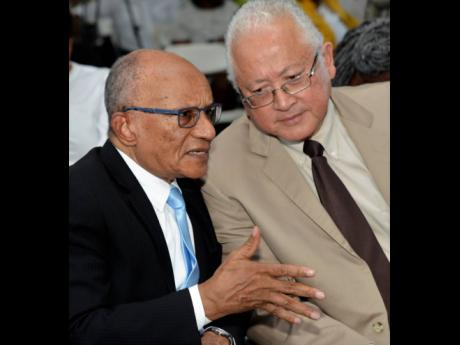NIA pitches New Zealand fraud office model in integrity law review
Head of National Integrity Action (NIA), Professor Trevor Munroe, wants lawmakers to search for “balance” as they review the so-called gag clause in the Integrity Commission Act, 2017, a provision that continues to be hotly debated among parliamentarians and anti-corruption crusaders.
Munroe, who made a submission before a joint select committee of Parliament that is reviewing the legislation, told legislators that he conducted an analysis of anti-corruption agencies in Hong Kong, Canada, the United Kingdom, Botswana, Nigeria, Singapore, Malaysia, and New Zealand and found that they are not restricted by a gag order.
Referencing Section 3(b) of the Integrity Commission Act, Munroe noted that a key objective of the state watchdog is to “enhance public confidence that acts of corruption and impropriety committed by persons exercising public functions will be appropriately investigated and dealt with in a manner which achieves transparency, accountability, and fairness”.
He argued that in order to achieve that objective, Parliament should replace Section 53(3) – the gag clause – with a formulation that balances transparency and accountability with confidentiality and fairness.
The NIA principal director also responded to a comment made by Justice Minister Delroy Chuck that the auditor general makes no statements prior to the completion of a report, which is then submitted to Parliament with good results in terms of reviews by the Public Accounts Committee.
However, Munroe said that although the auditor general does not speak on probes before filing reports, the legislation governing the work of the department had no provision that bars the making of statements or disclosing what investigations were under way.
He pointed out that the Auditor General Department’s website has a section that highlights some of the audits being conducted by the chief guardian of public expenditure, with the site stating, “The main aim of listing the audits in progress is to allow citizens/whistleblowers to provide information that may be useful to the audit.”
“The auditor general is allowed to put audits on her website to facilitate whistleblowers. What compelling reason could there be for the Integrity Commission not to be able to put on its website investigations in progress?” Munroe questioned.
Chuck and his fellow lawmakers on the committee have insisted that the Integrity Commission can use Clause 36 of the legislation to submit preliminary reports on investigations that they are pursuing.
Section 36 (3) of the Integrity Commission Act states: “The commission may, at any time, submit a report relating to any particular matter which, in the opinion of the commission, requires the special attention of the Parliament.”
Julian Robinson, member of parliament for St Andrew South East, said: “My position is the Integrity Commission should utilise that mechanism to keep the public updated about what it is doing without violating the principles of potentially tarnishing reputations which is more easily done when you are engaging with the media through release or interviews.”
Minister of Legal and Constitutional Affairs Marlene Malahoo Forte said the gag clause could not make the commission comatose as suggested by a member of the anti-corruption body.
“I still cannot understand why the commission has taken umbrage to a provision that says ‘just wait until you table it’,” she said.
In his submission on Wednesday, Munroe suggested that Jamaica’s Integrity Commission adopt an approach crafted in legislation that governs the Serious Fraud Office (SFO) in New Zealand, which is the lead law enforcement agency for investigating and prosecuting serious financial crimes, including bribery and corruption, in that country. It is also tasked with anti-corruption prevention.
The NIA boss said that the SFO considers several matters before making a public statement on an investigation so as to enhance – but not compromise – the probe.
Before issuing a public statement, the SFO looks at a number of factors, including public interest, reputational damage or harm to individuals or businesses under investigation, level of detail required to ensure high levels of accuracy in reporting and investigation into the relevant matter by other organisations.

